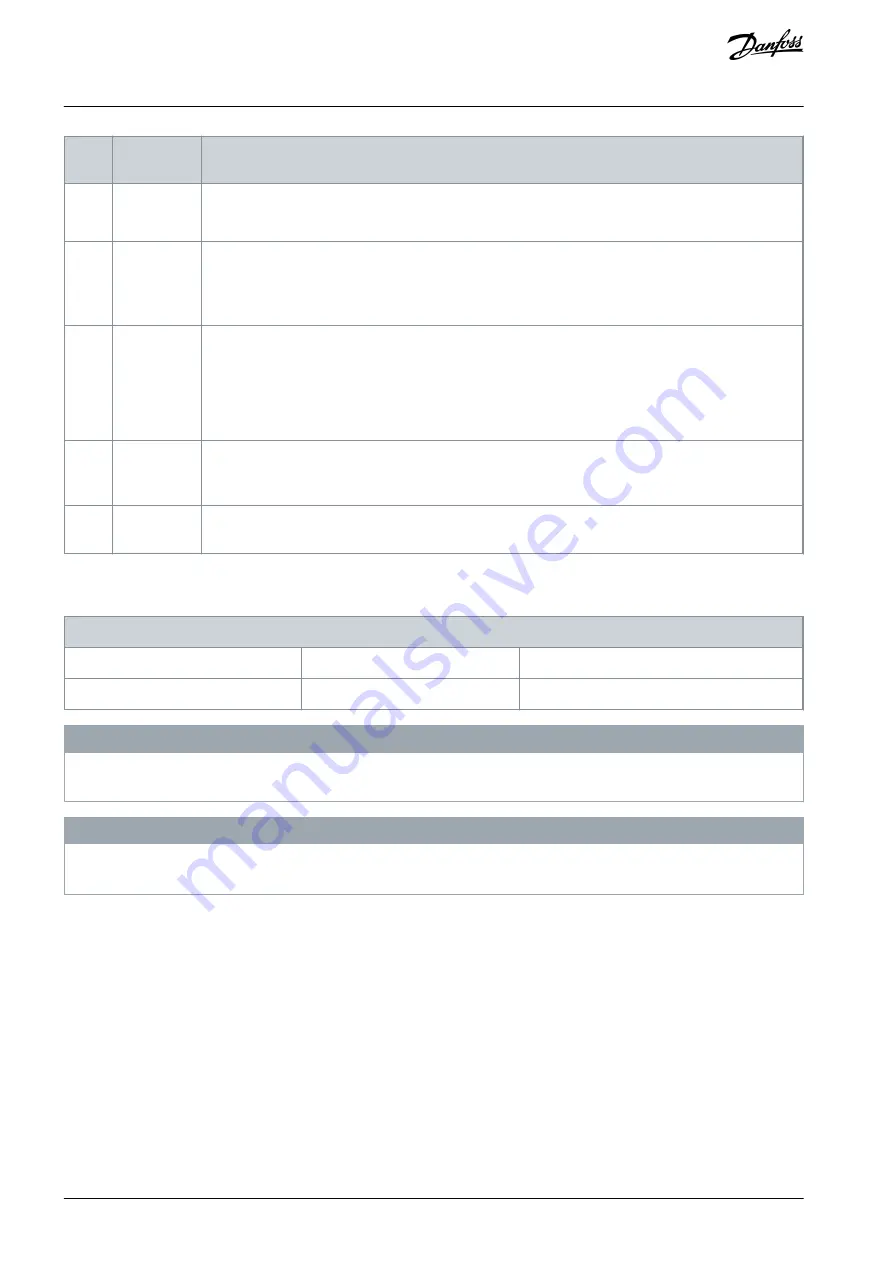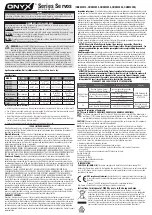
Op-
tion
Name
Description
Start Current
. This function is typically used in hoisting applications without counterweight and especial-
ly in applications with a cone-motor where the start is clockwise, followed by rotation in the reference
direction.
[4]
Horizontal
operation
Only possible with VVC
+
. For obtaining the function described in
parameter 1-74 Start Speed [RPM]
and
parameter 1-76 Start Current during the start delay time
. The motor rotates in the reference direction. If the
reference signal equals 0,
parameter 1-74 Start Speed [RPM]
is ignored and the output speed equals 0. The
output current corresponds to the setting of the start current in
parameter 1-76 Start Current
.
[5]
VVC
+
/flux
clockwise
For the function described in
parameter 1-74 Start Speed [RPM]
only. The start current is calculated auto-
matically. This function uses the start speed in the start delay time only. Regardless of the value set by
the reference signal, the output speed equals the setting of the start speed in parameter 1-74 Start
Speed [RPM].
[3] Start speed/current clockwise
and
[5] VVC+/Flux clockwise
are typically used in hoisting
applications.
[4] Start speed/current
in reference direction is particularly used in applications with coun-
terweight and horizontal movement.
[6]
Hoist mech.
brake rel
For utilizing mechanical brake control functions (
parameter 2-24 Stop Delay
to
parameter 2-28 Gain Boost
Factor
). This parameter is only active in flux control principle, in a mode with motor feedback or sensor-
less mode.
[7]
VVC
+
/flux
counter-cw
Parameter 1-73 Flying Start
Table 125: Parameter 1-73 Flying Start
1-73 Flying Start
Default value: Size related
Parameter type: Option
Setup: All setups
Conversion index: –
Data type: Uint8
Change during operation: False
N O T I C E
This function is not recommended for hoisting applications. For power levels above 55 kW, flux mode must be used to achieve
the best performance.
N O T I C E
To obtain the best flying start performance, the advanced motor data,
parameter 1-30 Stator Resistance (Rs)
to
parameter 1-35
Main Reactance (Xh)
, must be correct.
This function makes it possible to catch a freely spinning motor, for example coasted because of mains dropout. When flying start is
enabled,
parameter 1-71 Start Delay
and
parameter 1-72 Start Function
have no function. When options
[1] Enable
and
[2] Enabled
always
are enabled,
parameter 1-58 Flying Start Test Pulses Current
and
parameter 1-59 Flying Start Test Pulses Frequency
are used to
specify conditions for flying start. For flying start version 1, options
[3] Enabled ref. dir.
and
[4] Enab. always ref. dir.
are set to search
for the motor in the reference direction only, which allows a faster execution of the motor catch. For flying start version 2, options
[11]
to
[14]
are specific to asynchronous motor (induction motor) in VVC
+
up to 132 Hz output frequency. These options provide a
faster, more reliable, and robust flying start. When
parameter 1-73 Flying Start
is enabled,
parameter 1-71 Start Delay
has no function.
Search direction for flying start is linked to the setting in
parameter 4-10 Motor Speed Direction
.
[0] Clockwise
: Flying start searches in
clockwise direction. If not successful, a DC brake is carried out.
[2] Both Directions
: The flying start first searches in the direction deter-
mined by the last reference (direction). If not finding the speed, it searches in the other direction. If not successful, a DC brake acti-
vates in the time set in
parameter 2-02 DC Braking Time
. Start then takes place from 0 Hz.
AU373327181955en-000101 / 130R1208
84 | Danfoss A/S © 2021.08
Parameter Descriptions
VLT® AutomationDrive EZ FC 321
Programming Guide
















































